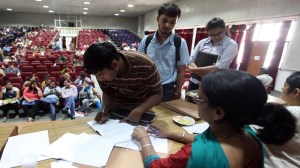- India
- International
Global Covid-19 wrap: Australia reports first death linked to AstraZeneca shot; WHO says rising cases worrying
Vietnam's health ministry called for the acceleration of its COVID-19 vaccine rollout on Friday as the expiry date of the Southeast Asian country's first batch of jabs supplied through the COVAX scheme fast approaches.
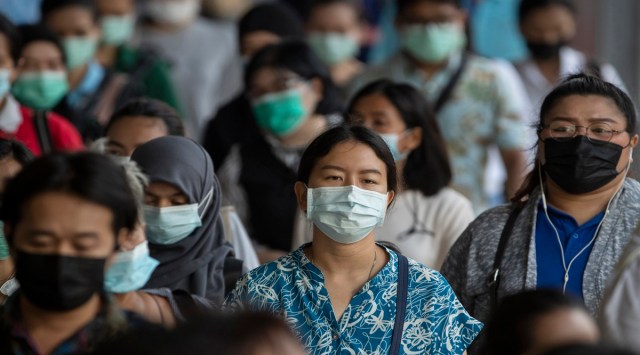 Office workers wearing face masks to help curb the spread of the coronavirus walk to work at Saen Saep pier in Bangkok, Thailand, Friday, April 16, 2021. (AP Photo/Sakchai Lalit)
Office workers wearing face masks to help curb the spread of the coronavirus walk to work at Saen Saep pier in Bangkok, Thailand, Friday, April 16, 2021. (AP Photo/Sakchai Lalit)Australia reported its first death linked to the AstraZeneca shot on Friday.
The 48-year-old woman was injected with the vaccine on April 8. That was hours before Australian authorities recommended people under the age of 50 take the Pfizer shot instead because of the small risk of rare blood clots associated with AstraZeneca, Therapeutic Goods Administration, the vaccine regulator, said in a statement.
She was admitted with blood clots to a Newcastle hospital in New South Wales state four days later and died on Thursday, the statement said.
The woman is the third case of blood clots in Australia officially linked to the vaccine since the national rollout began in early March. About 885,000 doses of the COVID-19 vaccine have been administered across the nation.
Growth in cases worrying, says WHO
Meanwhile, the head of the World Health Organisation said coronavirus cases are continuing to rise globally at “worrying” rates and noted that the number of new cases confirmed per week has nearly doubled during the past two months.

At a press briefing on Friday, WHO Director-General Tedros Adhanom Ghebreyesus said the number of new cases “is approaching the highest rate of infection that we have seen so far in the pandemic.Tedros said some countries that had been able to avoid widespread COVID-19 outbreaks are now seeing steep increases, citing Papua New Guinea as an example.
“Until the beginning of this year, Papua New Guinea had reported less than 900 cases and nine deaths,” Tedros said. The country has now identified more than 9,000 cases and 83 deaths, half of which were reported in the last month. “Papua New Guinea is a perfect example of why vaccine equity is so important,” Tedros said, adding that the Pacific island nation has relied on vaccine donations from Australia and the UN-backed COVAX initiative.
Denmark expects to reopen economy soon
Denmark on Friday said that it would reopen the economy sooner than expected as COVID-19 infections decrease, allowing indoor service at restaurants and cafes and football fans to cheer from the stands from April 21, weeks earlier than originally planned. Denmark has avoided a third wave of the COVID-19 epidemic after imposing wide lockdown measures in December, which slowed the epidemic considerably to between 500-700 daily infections from several thousands in December.
Most of the planned reopening schemes are contingent on the use of a so-called “corona-passport”, which shows whether the holder has been vaccinated, has previously been infected or has taken a test within the last 72 hours.
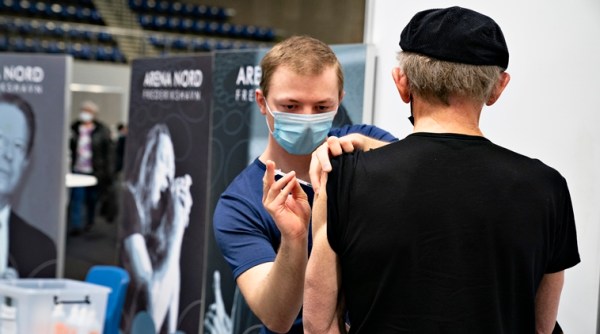 A person receives the COVID-19 vaccine as members of the Aalborg Symphony Orchestra play at the vaccination center in Arena Nord in Frederikshavn, Jutland, Denmark, Monday April 12, 2021. (Henning Bagger/Ritzau Scanpix via AP)
A person receives the COVID-19 vaccine as members of the Aalborg Symphony Orchestra play at the vaccination center in Arena Nord in Frederikshavn, Jutland, Denmark, Monday April 12, 2021. (Henning Bagger/Ritzau Scanpix via AP)
“Denmark is in a good place with room for further reopening,” Minister of Justice Nick Hekkerup said in a statement. “But it requires that we stick to the good habits, keep getting tested and continue to use the corona-passport to access some of the things we want,” he said.
As part of the deal agreed by the government and most of parliament early on Friday, the limit on outdoor public gatherings will be raised to 50 from 10 on April 21. The plan is to remove the ban on outdoor public gatherings on June 11. The deal includes reopening of shopping malls, museums, libraries, indoor serving at restaurants and cafes, indoor sports for people under 18, and allows more students to resume classes.
Football fans will also be able to return to stadiums next week in separate sections each holding 500 spectators. All spectators must show corona-passports and will be registered with a view to trace any new outbreaks of the virus.
Not thinking of cancelling Olympics: Seiko Hashimoto
Tokyo’s Olympics chief said on Friday that Japan was committed to holding a safe Games this summer, as a surge in COVID-19 cases prompted an expansion of contagion controls and with fresh calls for the Games to again be postponed or cancelled. The government expanded quasi-emergency measures to 10 regions as a fourth wave of infections spread, casting more doubt on whether the Olympics can be held in Tokyo in fewer than 100 days.
“We’re not thinking of cancelling the Olympics,” Tokyo 2020 President Seiko Hashimoto said, speaking on behalf of the organising committee. “We will continue to do what we can to implement a thorough safety regimen that will make people feel complete safety.”
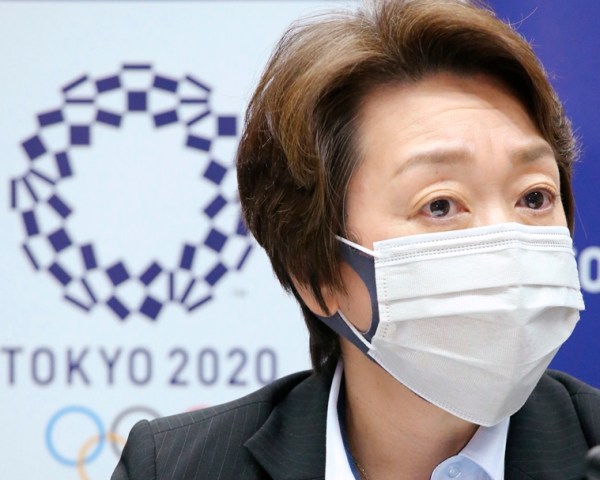 Seiko Hashimoto, the head of the Tokyo Olympics speaks during a press conference in Tokyo, Friday, April 16, 2021. Tokyo Olympic organizers are again being forced to assure the world that the postponed games will open in just over three months despite surging COVID-19 cases in Japan. (Kyodo News via AP)
Seiko Hashimoto, the head of the Tokyo Olympics speaks during a press conference in Tokyo, Friday, April 16, 2021. Tokyo Olympic organizers are again being forced to assure the world that the postponed games will open in just over three months despite surging COVID-19 cases in Japan. (Kyodo News via AP)
Japan’s top health experts have acknowledged that the COVID-19 pandemic has entered a fourth wave. Daily cases in Osaka reached a record 1,209 on Friday, driven by a virulent strain of the virus first identified in Britain. New infections in Tokyo were 729 on Thursday, the most since early February when most of the nation was under a state of emergency.
Almost two-thirds of Japanese said the Olympics should be cancelled or postponed, a Jiji news poll showed on Friday. A senior ruling party official said on Thursday that cancelling this year’s Olympics remains an option if the coronavirus situation becomes too dire. A scaled-back torch relay is already underway.
Olympic organisers said on Friday that on the main island of Okinawa in Japan’s southernmost Okinawa prefecture, they would stage the relay in restricted areas without spectators instead of on public roads. Overseas fans have been barred from the Games and officials say that domestic fans may be kept out too.
Olympic and government officials have said further postponement of the Games is out of the question. But a groundswell of health experts have said it’s too risky to hold the Games this summer.
First batch of Pfizer vaccine reaches Ukraine
The first batch of Pfizer-BioNTech COVID-19 vaccine arrived in Ukraine on Friday, the health ministry said. The batch of 117,000 doses, provided under the global COVAX scheme, will be given to nursing home residents and staff, emergency workers and border guards, it said in a statement.
Ukraine has already received India-made AstraZeneca vaccine and China’s Sinovac, and around 430,000 people have received their first shot.
Daily cases in Poland expected to fall
Poland’s new daily coronavirus cases will likely fall in the coming days and the country seems to have passed the worst in its hospitals too, its health minister said on Friday. The country of 38 million, the largest in the European Union’s eastern wing, reported a high of around 35,000 cases a day at the start of April.
“The trend seems absolutely downward… Also in hospitals we seem to have passed the peak,” Health Minister Adam Niedzielski told public radio. Prime Minister Mateusz Morawiecki added on Friday that Poland could achieve herd immunity by the end of the second quarter thanks to a speeded-up vaccine roll-out.
But a spokesman for the Health Ministry warned that there was no space to loosen restrictions and the situation remained very dire. “We see the light at the end of the tunnel that could suggest that we are slowly exiting the pandemic’s third wave, but we have to maintain our discipline,” spokesman Wojciech Andrusiewicz told a news conference on Friday.
Doctors have complained that they do not have enough staff as the third wave has piled pressure on intensive care units in recent weeks.
Second firm in South Korea to produce Sputnik V
South Korea’s Huons Global Co Ltd will lead a consortium to produce 100 million doses of Russia’s Sputnik V COVID-19 vaccine per month, as Moscow seeks to increase production globally to meet rising demand. The deal to produce Sputnik V – for export rather than domestic use – is the second in South Korea and comes after biotech firm GL Rapha signed a deal late last year to make more than 150 million doses of the vaccine per year.
Shares in Huons Global jumped 29.8% to their daily limit on Friday, hitting their highest level since September 2018.
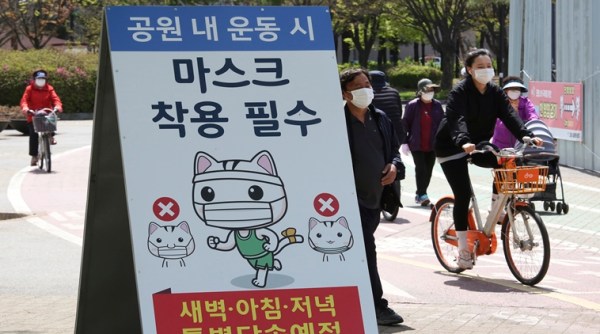 People wearing face masks pass by a banner displaying precautions against the coronavirus at a park in Goyang, South Korea, Tuesday, April 13, 2021. The banner reads “Must wear masks.” (AP Photo/Ahn Young-joon)
People wearing face masks pass by a banner displaying precautions against the coronavirus at a park in Goyang, South Korea, Tuesday, April 13, 2021. The banner reads “Must wear masks.” (AP Photo/Ahn Young-joon)
Huons said on Friday its consortium will begin producing sample batches in August and would respond flexibly to supply demand from the Russian Direct Investment Fund (RDIF), Russia’s sovereign wealth fund. The consortium includes three other local companies – Prestige BioPharma, Humedix and Boran Pharma – which will build a new production facility, Huons said in a statement.
German finance minister to receive first vaccine shot
German Finance Minister Olaf Scholz said he was due to receive his first shot of AstraZeneca’s COVID-19 vaccine on Friday. “I have always said I would get vaccinated when it is my turn,” the 62-year-old politician told journalists on Friday. “Today is the day. Immediately afterwards, I will receive a jab of the AstraZeneca vaccine.”
According to German media reports, Chancellor Angela Merkel, 66, will also receive the AstraZeneca vaccine on Friday. The chancellery declined to confirm the reports.
Vietnam health ministry calls for accelerating vaccine rollout ahead of vaccine expiry
Vietnam’s health ministry called for the acceleration of its COVID-19 vaccine rollout on Friday as the expiry date of the Southeast Asian country’s first batch of jabs supplied through the COVAX scheme fast approaches.
Since it began its vaccination programme last month, Vietnam has inoculated around 73,000 people despite receiving nearly one million AstraZeneca doses, 800,000 of which were obtained via the COVAX vaccine-sharing scheme.
“The (AstraZeneca) COVID-19 vaccine has a shelf life of 6 months but the batch delivered to Vietnam on April 1 under the COVAX scheme only has two months left till expiration,” the ministry said in a statement on Friday. “We have to speed up the inoculation. It is not acceptable that a single dose of the vaccine is thrown out because of a failure in the rollout,” the statement added.
The health ministry requested all 19 localities which have started vaccine programmes to finish no later than May 5, 26 days before the vaccines expire. The health ministry said Vietnam had carried out its vaccination campaign at a higher safety level than the World Health Organization’s recommendation but that safety should not be the reason for a slow vaccine rollout.
Thailand to close bars, schools, ban alcohol sales for two weeks
Thailand will close close schools, bars and massage parlours, as well as ban alcohol sales in restaurants, for at least two weeks starting from Sunday after a jump in COVID-19 cases, a senior official said. Activities involving more than 50 people will also be prohibited, Thailand’s coronavirus taskforce spokesman, Taweesin Wisanuyothin, said, adding that 18 provinces including Bangkok had been labelled as red zones with the rest of the country categorised as orange zones.
Thailand reported on Friday its fifth record daily tally of coronavirus cases this week, as
authorities set up thousands of field hospitals to cope with an influx of patients and lined up hotels to provide extra beds for those without symptoms. All positive cases have to be admitted into care under Thai rules, and with 10,461 patients being treated the medical sector could be put under additional strain.
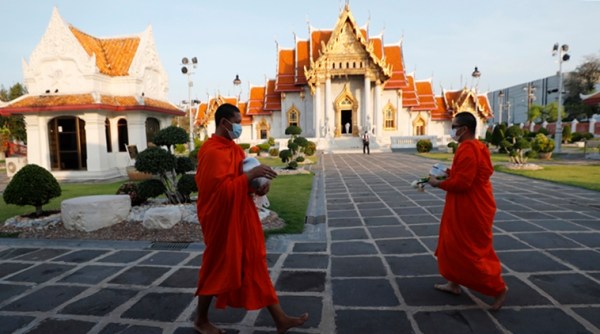 Buddhist monks wear face masks to protect themselves from the coronavirus during a morning alms offerings at Marble Temple in Bangkok, Thailand Friday, April 16, 2021. (AP Photo/Sakchai Lalit)
Buddhist monks wear face masks to protect themselves from the coronavirus during a morning alms offerings at Marble Temple in Bangkok, Thailand Friday, April 16, 2021. (AP Photo/Sakchai Lalit)
More than 20,000 beds have been set up at field hospitals across the country at community centres and gyms. Hotels and hospitals are also partnering to set up “hospitals” to treat asymptomatic patients, the health ministry said.
Five thousand beds across 23 hotels had been readied, it said in a statement. About 2,000 beds are occupied and an additional 7,000 more could be added. Hotels already hosting travellers to Thailand for quarantine were best positioned for this, Marisa Sukosol Nunbhakdi,
president of the Thai Hotels Association, told Reuters.
Hotels register through the health ministry and are matched with hospitals that require extra beds. The hotels range from three- to five-star facilities and are mostly on the outskirts of Bangkok, the epicentre of the latest outbreak, which saw 312 new infections on Friday.
UK sees slow growth in population growth amid pandemic
The United Kingdom’s population rose to 67.1 million people in the middle of last year from 66.8 million in mid-2019, the weakest annual growth since 2003 as the country felt the initial effects of the COVID pandemic. COVID-19 has claimed more than 127,000 lives in Britain, the highest total in Europe – though most of those were recorded after the mid-point of last year. It also appears to have led to a sharp fall in immigration to Britain, at least temporarily.
The United Kingdom’s population growth rate in the year to mid-2020 dropped to 0.47% from 0.54% in the year to mid-2019, according to provisional data published by the Office for National Statistics on Friday. The ONS described the growth estimate as “marking one of the smallest increases seen in the context of historical trends”.
The ONS has been unable to publish its usual immigration data for periods after the start of the COVID pandemic, as they relied on face-to-face surveys at airports. Friday’s population data included modelled estimates for net migration between March and June. The ONS said it would publish a more accurate population estimate for mid-2020 this summer.
Restaurants to reopen in Finland from next week
Finland on Friday said it would allow all restaurants to reopen next week after a steady fall in coronavirus infection rates over the past month. Restrictions to opening hours, alcohol sales and the number of guests will apply, the government said. In the region around the capital Helsinki and some other areas still battling the epidemic, restaurants will be allowed to take in half of their capacity, sell alcohol until 5 pm and need to close by 7 pm.
The government on Friday also decided Finland will temporarily give more vaccinations to areas where the virus is spreading fastest such as in the capital region. According to data from the Finnish health institute, 1.2 million Finns have now received at least one vaccination dose.
On Thursday the health minister said Finland is seeking to negotiate a possible deal to buy Russia’s Sputnik V vaccine.
Worries over Covid-19 has increased surge in seeking professional help in Denmark
Social distancing and worries over COVID-19 have caused a surge in Danes seeking professional help to ease anxiety and depression they developed during the pandemic, the chief executive of Scandinavia’s biggest insurer, Tryg, said on Friday.
“Corona is starting to seriously tax Danes’ mental health,” Tryg CEO Morten Hübbe told Reuters after the company published first-quarter results.
Tryg, which means “safe” in Danish, saw the number of claims for mental illnesses rise in the first quarter of this year, continuing a worrying trend from last year. Anxiety claims had risen by 20% in the second half of 2020 and depression claims rose by nearly 15% in the same period, the company said. A similar trend had been registered in Tryg’s Norwegian business.
“It is becoming clearer that it’s not without challenges for our mental health that we lack social interaction, and are more worried because of corona,” Hübbe said. Tryg’s data also showed the average length of treatments had lengthened during the pandemic, meaning Danes needed more sessions before recovering.
Apr 23: Latest News
- 01
- 02
- 03
- 04
- 05






